#incredibly disordered
Text
For all the things I cannot feel or understand, why tf do I experience obsession? Why tf can I experience parasocial connections? I barely connect to people who live with me. I can barely comprehend those I’m closest to. What’s the difference? Maybe the parasocial is similar to how it feels to read a book? It’s on the same spectrum as imagination?
Growing up, when I had crushes, it felt quite similar, so I suspect it’s related to fantasy (pg) and imagination or creativity. It’s my brain making it feel significant because it’s nicer than being alone. My brains filling in the gaps, fitting someone else into a role. That’s my suspicion.
But it makes me wonder. It feels related to my sapiosexuality. My most intense attraction is felt towards those who I think are intelligent in a way I’m not, or a way I wish I was. Or even in a way I am, who express it differently than I could. I don’t see intelligence on a line, I see it on a spectrum in every direction.
I guess to tie it all together — I fixate on what I aspire to be, or the ghost of what I could have been; if someone exceeds my abilities or is more clever, I can’t help but getting tripped up. Your “attraction” is my obsessive fixation trying to figure out how to be better than everyone else. As I am a distorted mirror of anyone who perceives me, so are all others a reflection of my eviscerated ego.
#aspd#personality disorders#free therapy for me#attraction#sexuality#sapiosexual#parasocial#obsession#oof#idk wtf is wrong with me#incredibly disordered#this is important#I might’ve just figured something out about myself fr#hopefully I remember this later or something#ahh#send me a reminder if you read this
6 notes
·
View notes
Text
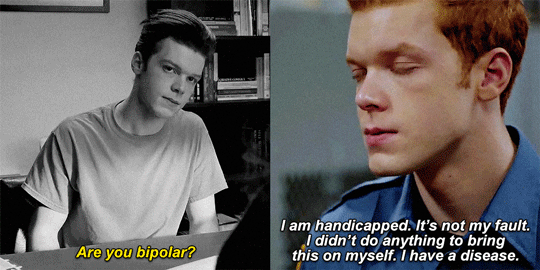


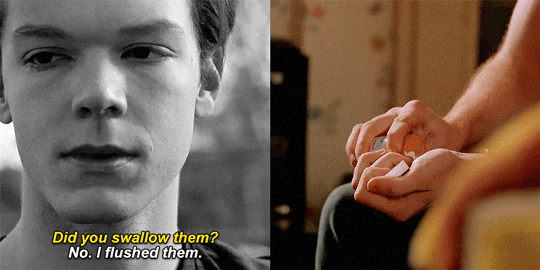
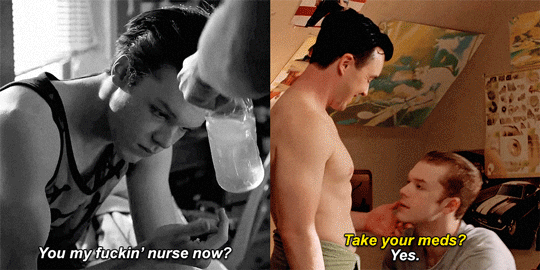


IAN GALLAGHER + his journey with bipolar disorder
╰┈➤ “At times, being bipolar can be an all-consuming challenge, requiring a lot of stamina and even more courage, so if you’re living with this illness and functioning at all, it’s something to be proud of, not ashamed of." - Carrie Fisher
#happy world bipolar day to all my bp babies#(more thoughts at the end of the tags)#shameless#shamelessnet#shamelessedit#ian gallagher#cameron monaghan#*macygifs#bipolar disorder#hello pals how are we doin#i made this gif set in july of 2023 and never posted it because 1) i was terrified to share it and potentially see Bad Takes in the tags#and 2) because my hyperfixation was waning. and while both of those things are still mostly true (the fixation comes and goes)#i feel like it's really important to share as ian's bipolar storyline was not only so vital to his character it was a bit of representation#that isn't often given to the disorder and those (like myself) who live with it every single day#world bipolar day is a day where we can both celebrate ourselves and our resilience and also raise awareness of the reality of the disorder#which is both terrifying and beautiful at its core. this disease is not a death sentence or a sentence to an unfulfilled and miserable life#while there are challenges galore when it comes to balancing life with this disorder it IS possible to live a full and productive life#and i think it's really important to have representation of that in media - and while shameless dropped the ball on a LOT of storylines#over the years THIS is the one they really fucking nailed and i am incredibly grateful#i first started watching shameless while in the midst of a major depressive episode and i was later (finally) diagnosed during an extended#hypo/manic episode - this show and ian's storyline got me through so much and made me feel so seen and validated in my struggles#world bipolar day is also vincent van gogh's birthday (happy birthday buddy) who was posthumously diagnosed with bipolar disorder#and who experienced both depressive and hypo/manic episodes during his lifetime (and was regularly institutionalized)#it takes a lot of help and support to keep us going. it takes the support of our family and friends and *most* of all#it takes patience and kindness and understanding - which is so so so easy to give if you are willing to love and listen#so please. be willing. listen to our stories. be patient with us. show us love without conditions. support us in any way you can.#we are worth it#i promise#anyway. that's really all i wanted to say. happy world bipolar day to those who celebrate (me) and may all of us living with this disorder#go on to live happy fulfilling beautiful magical lives
598 notes
·
View notes
Text
hot take but the reason why beez and gabriel figured their shit out so quickly is because they both have a solid sense of who they are as a person and the relationships adds to that instead of threatening their sense of identity.
if, for some reason, they had landed on "yeah no we won't work" they would have been sad/disappointed/heartbroken, but ultimately beez is happy with who they are and so is gabriel. nina and maggie decided to NOT get into a relationship for the same reason, they respect themselves and each other enough to put personal growth and their mental health first instead of attempting to solve trauma responses and hypervigilance by making someone the turning point of their world.
aziraphale and crowley, on the other hand, aren't just dogshit at communicating, they have also build their sense of identity around each other and thus the thought of not being together automatically comes with a loss of personhood, trapping them in "i need them to live and will be destroyed if they're not with me". which is incredibly self-destructive and deeply unhealthy, and not a foundation for a functional relationship.
the solution to that is not to glue them together and call it a day, it's to allow both of them the space and grace to grow as individuals and develop a healthy sense of self so the relationship is build on mutual respect AND self respect.
#alex talks good omens#good omens#ineffable husbands#crowley#aziraphale#good omens season 2#go2#aziracrow#crowley x aziraphale#ineffable divorce#like besties listen to me okay i have bpd a severe dissociative disorder and a horrible case of cptsd#i KNOW what it's like to be emotionally obsessed with someone and make them the reason for your existence#and while yes it provides *some* amount of emotional satisfaction#it is NOT GOOD AND WILL FUCK YOU UP#it will make all your issues WORTH and DESTROY THAT RELATIONSHIP unless you work on it a lot and are incredibly self aware#put yourself first and learn how to form healthy attachments otherwise the relationship ain't gonna work#and instead just be toxic as all hell
534 notes
·
View notes
Text

#do you ever hear something so incredibly simple but spot on to your life experience you immediately start crying?#im exhausted#ocd#obsessive compulsive disorder#turtles all the way down#not yr
271 notes
·
View notes
Text
im gonna start a fight; and, at the same time, i need you to take this in the most good-faith way possible, but:
videos that involve body-checking and intentionally (and uncritically) show a mealplan of an unhealthy number of calories are just a revamped version of pro-ana food diaries.
and yeah, i know there's arguments. i address some of them under the cut. but at the end of the day, we're just coming back to romanticizing mental illness; we've just found a better platform for it.
this is already something we've done. we knew it was wrong and tried to stop it. and tbh. it just wasn't enough.
there are people who argue "well, what if you have an eating disorder, you can't help it if you don't eat!" except that as someone with an ED; we are not infants. we know what we're doing. part of having an ED is that you are like, maybe too self-aware. even if we can't help our own food choices, we don't need to fucking romanticize the disorder - something we've been warning you about since 2013. there are hours of setup, filming, and editing that go into these videos. they do not happen to fall into place randomly. there is a reason they are pieced together to be beautiful, bright, inspiring.
there's this woman who pretty much only posts daily plans under a normal amount of calories, and everyone defends her saying but it's better than nothing! and i'm like. except she opens those with images of her showing off her body and provides no context in the video or caption that suggests that she believes what she's doing is unhealthy. she has hundreds of thousands of followers on a platform designed for young kids and teens. i refuse to believe that by accident her content just happens to be cheery advice on "healthy" versions of starving.
for any other symptom of mental illness, we would be incredibly enraged by this kind of placid acceptance of a "tips and tricks" fast-start guide. imagine if people posted pink & pretty videos saying "best places to cut yourself" as if it was a fucking storytime. we, as a society, are so fucking fatphobic that we would rather accept blatantly harmful displays of self harm than admit that we are obsessed with a hyper-thin body type.
i am not suggesting someone never talks about their disorder. i talk about mine. actually, it's a plot point in my book.
here's the difference: i recognize it's a fucking mental illness. i am very careful to never mention a specific weight, eating pattern, or calorie plan. i always make sure to position it as something that ruined my fucking life. i do not put cheery music in the background and hearts and sparkles over my worst moments. i do not film it in bright light. i do not start each passage with an image of a thin body followed by "here's how to look like her."
eating disorders should not be framed as aspirational. and the problem is that society worships the "after" image, so long as you don't get too sick. there is a reason so many people who quit being "influencers" will later admit - i wasn't eating well that whole time; an obsession with food was completely destroying my life.
we let any uncredited, uncertified person write the most backwards, fucked up shit about how to get the body you desire! because the underlying, secret belief is: well, at least they're thin! and the real thing that fucking gets me each time - they make fucking money off of it. their irresponsibility and societal harm literally pays off for them.
"why do you care so much." "don't like it don't look." "so what if people experiment with new ways of thinking of food?"
thank you for asking. we're about to get extremely personal. it's because when i was 18 i discovered "thinspiration"/"thinspo." and it absolutely influenced, shaped, and codified my pre-existing eating disorder. i went from having some troubling habits and traits to being incredibly unwell within what felt like a matter of days. there were actual pages designed to train me on how to have an ED correctly. it was all so suddenly easy. i was sick; and the nature of the illness meant - i wanted to be sicker.
it takes an average of 7 years for a person to fully recover. i know this personally - even now, 10 years from the worst of it, i still fucking struggle. i am so much happier now and i eat what i want and i literally don't think about food at all (19 year old me would shudder) and yet - i still fucking know the calories of plain toast with butter.
an eating disorder is one of the deadliest types of mental illness. over 1 in 4 people with an ED will attempt suicide.
and i'm sorry. i just do not see the exchange rate of "high rate of engagement" versus "the value of a human life."
#and there's something else in there about like ....#tbh once i got over something like 1k followers#i stopped being specific about my ED for a REASON.#yes on ur personal locked blog that u use like a diary go ahead etc#but we are OBVIOUSLY not talking about that. we're talking about the sheer NUMBER of people i could be talking about#in that one paragraph. that you and i probably were thinking about 2 different influencers#bc they get to say that they're just posting FITNESS and if it's FITNESS it's OKAY and im like#jesus christ lord almighty#every person in recovery from an ED: this is incredibly dangerous holy shit do you know how much this would have triggered me#each of these ppl: how dare you!!!!!!!!! i am only harming those who WANT to engage with my content!!!!!#their followers: leave them alone !!! they can't help that they make an hours-long choice to frame their disorder as if it was#fucking cottagecore !!!!#like girlie this person needs THERAPY#again! i didn't even have that large of a following before i IMMEDIATELY deleted any specific mention of calories food etc#bc i recognize responsibility and i didnt EVER want to even ACCIDENTALLY encourage this#and im not even GETTING PAID FOR THIS!!!#aND THEY ARE!!!#something something something they know this content makes them money#they don't give a SHIT about u babe
1K notes
·
View notes
Text
If you're gonna go around talking about how invalid self-diagnosis is and how you should ALWAYS just go to a doctor because they're the experts, consider doing the following instead:
Reminding yourself that no doctor is infallible, and unfortunately there are shitty and VERY misinformed doctors out there
Advocate for the spreading of accurate information about the neurodivergence or illness or disorder or etc.
In that same vein, dispel myths and misconceptions about said Brain And Body Things™
Advocate for easier access to evaluation and diagnosis
Support people who have been medically gaslit in the past and just want to know what's going on with themselves
Support people who have had their life affected by their symptoms (despite not knowing what was causing them) and just want to know what's going on with themselves
Support people who just Feel something Wrong and just want to know what's going on with themselves
Just fucking support people and stop tearing others down because you're white knighting
There are people intentionally making a mockery of things like DID or being autistic, among other things. And there are people who mis-self-diagnose (usually due to research that isn't deep enough) and are fed misinformation which leads to them misrepresenting the disorder.
But there are also people who have the symptoms, looked into the symptoms, found something that matched the symptoms, and maybe FINALLY felt they had an answer when they couldn't find one because they didn't have the means or whatever the reason.
And you're telling them that they're making a mockery of a disorder because they wanted to find a reason. And it's because you associate them with the people on TikTok that you roll your eyes at. And it's fucking annoying.
TL;DR:
Maybe instead of being a dick about self-diagnosis, you could help set a path towards making it so people don't have to in the fucking first place.
(Also, as for my opinion on self-dx, self-dx with a good amount of research from verified accurate sources = A-OK. I'm saying this as a professionally diagnosed person who has had to self-dx in the past. I've been wrong about some things and right about others, and professionals have been right about some and wrong about others. But it helped to set me down the right path. I wouldn't be where I am if I hadn't.)
#day.docx#actuallydid#actually did#actuallydissociative#actually dissociative#actually autistic#actually autism#actually adhd#dissociative identity disorder#other specified dissociative disorder#autism#autism spectrum disorder#adhd#attention deficit hyperactivity disorder#i am so. fucking. tired of this shit.#i am incredibly privileged to have been able to get help#ESPECIALLY being black and AFAB#and having cfs—a disorder which doctors often don't understand—makes me particularly passionate about it#bc a lot of doctors do “well you seem fine. you're just tired? have you tried more physical activity?” (lmfao)#either do something about it‚ however small it may be‚ or just fucking stop#it's getting old#it's BEEN old
157 notes
·
View notes
Note
schizoid culture is being married for 10+ years, since -against all odds and your parents fear, you found another schizoid person. And your marriage is more stable then any other relationship you encountered … because you are just two voids existing next to each other, doing their own thing (or rather, nothing).
And it’s fine for both of you.
(Also: sleeping in separate rooms, being childfree by choice and migrating to a different country so you don’t have friends or family that could bother either of you.)
-
#that’s incredible!!#good for you anon!#personality disorder#schizoid#schizoid pd#schizoid personality disorder#scpd#szpd#cluster a#cluster a pd#schizoid culture is
83 notes
·
View notes
Text
having adhd (or just generally being forgetful) is so fucking frustrating because you’ll lose something you literally just had in your hand and then proceed to go on a 45 minute quest to find said lost thing. meanwhile, you’re both the detective and the suspect, just trying to follow clues and patterns that make no sense. i’ll lose something, then grab my brain by the collar and go, “where tf is my charger. u just had it”. and my brain will just be like:

#actually adhd#adult adhd#attention deficit disorder (add)#attention deficit hyperactivity disorder#object permanence#forgetfulness#I hate it so much I have to hunt through clues as though it’s not my own brain and my own lack of object constancy#some nts will be like aw adhd is so cute and quirky meanwhile I’m fist fighting my hippocampus and defective dopamine receptors in an arena#adhd is in no way cute or quirky I break down crying on the regular bc it’s just so incredibly frustrating to not be able to remember#if u romanticize mental illness or neurodivergency I will steal all your bones
2K notes
·
View notes
Note
Omg hi Ms. Yellow Caballero big fan of your work <3 For real though, I'm really excited that your sharing the Weekenders, it was a joy to read and I'm bongocat-ing now that others also get the privilege to read it as well.
Referencing your tags, would you please elaborate of ableism in fandom and, like you said, how fandom treats characters with unpalatable disabilities?
Hi Ms. Bud Lite I'm a big fan of you <3
TL;DR A fear of writing characters of highly marginalized identities shields you from criticism and discomfort, but it's actively stigmatizing to people of these identities and as a writer you really need to get over yourself and write The Icky People.
I guess I'll come out swinging on this one and say that fandom doesn't like severe mental illness. (As a note, when I say severe mental illness (SMI) I mean illnesses such as psychotic disorders, bipolar disorder, substance use disorders, personality disorders, etc)
Obviously, nobody likes people w/SMI. It's just insanely egregious in fandom to me, since fanfic writers absolutely love writing characters or HC characters with depression, anxiety, or a specific variety of PTSD That Isn't Scary. People actively reject any character HCs for a SMI. When people write a character with SMI, they nicely downplay it, ignore it, substitute it for a disorder they like better, or rewrite it. It's completely untolerated, in both headcanons and in fanfiction, and every time I bring it up I always get the most interesting reasons why somebody couldn't possibly acknowledge a character's SMI in their writing. I've heard all of these:
"I don't know enough about the disorder to write it accurately." Do research.
"I'm not X, so I can't really depict it." You probably aren't a cis white man, but you depict those guys just fine.
"It feels insulting to the character." There is no shame in having a SMI.
"I can't understand what it's like, so it's better to be cautious and avoid giving characters stigmatized identities." There are LOTS of experiences that you'll never understand because you've never had them - you just don't want to write anything you're uncomfortable with. People with SMI make you uncomfortable, and you don't want to write anything that makes you feel uncomfortable, or think of a comfort character in an uncomfortable way. SMIs are marginalized differently than solely depression/anxiety/The Nice PTSD, and by refusing to write them you're actively contributing to the stigma.
I think (?) I've spoken in the past about how I believe that the rigorous external and internal policing of writing people of marginalized identities is actively harmful towards efforts to increase diversity of experience and background in fiction. A lot of fanfiction writers are just terrified to write people who they can't directly relate with, because they're worried 'they'll get it wrong' and be Big Cancelled. I think this is negative enough when it prevents people from going outside of their comfort zone, but on a macro level I think this results in people refusing to write characters of marginalized identities as all. It's an insidious thought process, and it's reflected in people's unwillingness to diversity their writing or acknowledge canon diversity.
'Well, I don't understand what it's like to be Black, so I don't want to write Black people'. 'I want to project on this character, so I only want to write them with mental illnesses and identities I have'. 'If I write a marginalized character incorrectly people will yell at me, so I won't write a marginalized character who's marginalized differently than me at all'. Can you imagine writing a lesbian character with a boyfriend because 'you feel uncomfortable writing lesbian experiences'? It's blatantly homophobic. But people do that with disability and race/ethnicity ALL THE TIME.
People with SMI notice that you feel uncomfortable with them. It's obvious. They notice when a character has a SMI + anxiety, and you only write their anxiety. They notice when a character displays symptoms of a SMI in canon, but you write it out. And POC notice when the characters of color are written out. I know we all like to project on the blorbos and relate to them, and in the joys of your own head do whatever, but as a writer if you only stick to identities you're comfortable with you are actively being a worse writer. Which to me is the REAL sin lmfao.
#my asks#thanks for enabling me lizzy if i didn't get this out i would have just vagued for the rest of time#even just beyond all of this on a more subtle lvl. HC people with SMI cowards. just do it. its good for you.#the two times me/a close friend have proposed on a fandom server "hey I read X as having a SUD/being on the schizophrenic spectrum'#there was actual fascinating pushback and rejection#people got MAD.#'blorbo wouldn't be an alcoholic he's not a bad person :(' fuck off#i dont use the word often but its ableism and you can be mentally ill and still ableist#if you dont feel educated enough on something to write it then do research#and while research wont give you everything it's a start#if you feel like you can only write people just like you then frankly? skill issue#i mentioned that the last fic was a bit of a spite fic - well#it was scientifically fascinating how the majority of a fandom wrote/acknowledged a character as depressed and anxious#but actively got incredibly defensive when someone suggested that the psychotic character may have had a psychotic disorder#it was so blatant. very annoying. anyway.
131 notes
·
View notes
Text
Hey! Why did I split over something not even THAT traumatic??
I'm here to tell you. :)
So, this particular discussion has come up in our system server before and it's actually something I've wanted to talk about for a long time on Tumblr because I've never actually seen someone talk about this, and I am being hit with a sudden god-like hubris at 3 in the morning, so here we go!
So your question was "Why did I just split? What just happened wasn't even that traumatic. I've been through so much worse in the past, I don't even feel that stressed. What the hell? Am I just making this new part up?" and on and on. The idea that only the most awful and traumatic things are what cause splits in DID (especially later in life, after the childhood trauma window of 7-9ish has ended and especially in adulthood) is actually incredibly false, and I am about to explain why.
Note: This is about traumagenic DID systems, so endogenic systems, please stay off of this post thank you. :) /not mad
Note number two: I do want to get out of the way, that all parts DO split for a reason, there's no parts that exist for no reason (even if the reason doesn't seem relevant to you now, it may have been relevant at the time of the split, OR may have been somehow relevant to your brain even if it doesn't make sense to you now.) So I want to make it really clear that splits do not occur only because of hyperfixations. There typically has to be something going on for a split to occur, and hyperfixation alone will not cut it. Alright, now that I've got that out of the way, let's talk about how DID brains run on patterns.
DID brains run on patterns, like I said. All brains do, actually, but DID brains take it to an nth degree because these patterns that it learns are what help it stay alive in a distressing and traumatic environment during childhood. Our brains are remarkably plastic and they will do whatever is necessary to survive a given situation. It's why something like DID can even exist.
So what kind of patterns do we typically see in brains with DID? Well, the easiest one is that a lot of people with DID have pretty similar alter "types" or "roles." This is just a widespread pattern that you see across a large demographic of systems. It's why terms like "gatekeeper" and "protector" and "caretaker" exist. Because nearly all DID systems have parts that fill those roles, even if those roles aren't filled in the most "traditional" sense. DID is rarely random, every part exists for an express reason, and that reason is almost always symbolic in some way, even if it doesn't seem like it now. Once you start learning trauma memories and WHY parts exist, you very quickly start to see the symbolism and sometimes it is absolutely fucking terrifying, to say the least.
What other patterns are common?
Well, patterns we see in our own system and in other systems are something quite literally called "splitting patterns" which are more common in polyfragmented systems but not exclusive to them. This has various ways of showing itself, and the user @foreverfragmented made a post awhile back that I'm having a really hard time finding, HOWEVER I did screenshot the section about splitting patterns when I first read it, attached below:
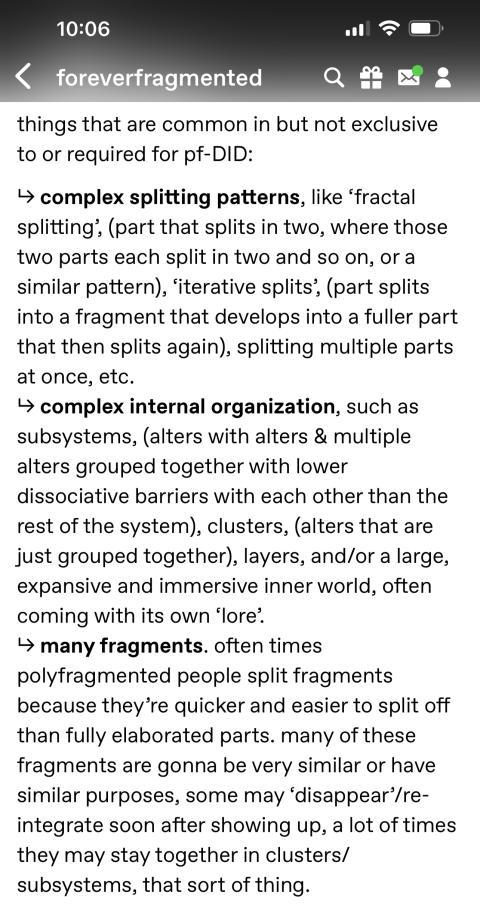
Wow that photo ended up bigger than I thought it would be. lol. Anyway. Those are another example of splitting patterns. (Note: in the original post, FF talks about how some of the terms above were coined by them or other systems, so not recognized medically, however I think they were worded perfectly which is why I shared them here.)
Another few examples include alter templates (AKA, splitting the same alter over and over in varying iterations), the same parts going out for the same types of trauma every single time, and why certain alter roles very often have the same "flavor" of personality.
For example, gatekeepers are often considered a bit cold and distant, and can be very analytically minded and rarely react purely on emotion alone. (I feel like the most common gatekeeper Myers-Briggs has gotta be INTJ...that was a joke, lmao.) This is typically for a reason. You have to have a certain mindset and a certain way of handling things to be able to properly manage a system. And this is not to say all gatekeepers are this way, but the pattern of a LOT of gatekeepers being like this is not unnoticed. Our DID specialist could tell pretty early on that our primary gatekeeper (James) was a gatekeeper long before he ever told her he was simply because of how he held himself, how he spoke about others in the system, and how much he despised her for "stepping on his toes"😂 They work together much better now, FYI, but it was rough in the beginning.
An example of alter templates in our system in particular is what we call the "Michaels." They were some of our earliest alters, and our brain was like "hey this guy is working really well, so I'm just gonna keep doing it." And it worked! Then, when trauma shifted to something completely different but in the same vein (CSA) our brain once again attempted to use this "Michael" template. It didn't work quite the same. And so our brain had to figure out these new patterns, which it was fucking desperate to do because we were going through some heinous shit that it could hardly even comprehend. I've learned that basically every blue-eyed white-haired motherfucker in here was a Michael copy at one point, but had elaborated into some other version that suited its job more.
Now, for the example that is going to actually help me explain the answer to the question posed at the very beginning of this post: alters who go out for the same things over and over.
So, depending on splitting tolerance, or whatever you happen to be going through in your childhood, you will likely have various "groups" of alters that handle certain things. If you had a particularly tumultuous childhood with several varying types of traumas, you will probably have several of these groups. And depending on length of trauma time, severity of trauma time, and levels of support during trauma time, these groups may be very large.
For example, if you had a situation like domestic violence (DV) happening in your household, you will have a part or parts dedicated just for DV, and if you also had CSA going on, you will have a separate group of parts (or a single part) who handles only the CSA. Unless your system is quite small and you have alters take multiple types of abuses, this is pretty commonly the case. [Note: want to say this is not subsystems unless these groups are highly separated via either amnesia barriers or inner world (IW) barriers, and have better communication with each other versus the rest of the system. The definition of subsystem gets a little funky, but we're not talking about that. Just wanted to make that clear. You can have groups of alters without them being subsystems.]
"Okay, so yeah, you're right. I have alter groups for [insert various traumas] what does that have to do with me splitting over [insert mundane thing that isn't even really traumatic]?"
Continuing on the "DID brains run on patterns" line of thinking, if your brain has patterns set and understood for the various traumas that you lived through in your childhood, usually up until teen years or adulthood, your brain knows what to do when those traumas occur again. The patterns are set. It's why it's super common for people with DID who experience SA in teen or adult years and don't end up having a split. Unless they have an extremely low splitting tolerance or the situation is extremely unique, the brain will just recycle what it already has. No need to go through the literally massively painful and traumatic experience of splitting again for something it already knows how to handle. This being said, the part that experiences this might end up splitting at a much later date if this trauma is far too difficult for it to handle, this is also common because sometimes it's "easy" to handle the trauma in the moment because they're used to this flavor of trauma but the processing of said trauma afterward can be just as traumatic and can cause a split.
Same if your father was super abusive to your mother, or vise versa, and you happen to have an abusive partner. That pattern is known and comfortable. That's what professionals mean by "DID systems are more likely to be victims of abuse than perpetrators." They return to the comfortable patterns, which, with DID, equals abuse. Things outside of those patterns are dangerous and confusing to navigate and the brain will avoid that at all costs.
However, and this is the answer to the question. What happens when something happens that the brain doesn't recognize in its "pattern database"? I'll give an example.
Say you were very high achieving in school. This is pretty common of systems who were diagnosed in adulthood, so far as I've seen. You likely did really well, had really high marks because your parents expected it of you or were abusive and angry if you didn't constantly constantly succeed in their eyes. This can also reflect in sports, clubs, musical talents, etc. This pattern continues on in adulthood. You push yourself very hard to be high achieving. Whether this be in a college setting, a work setting, etc. You are likely often doing well in those fields pre-system discovery, at least. Post discovery often leads to the "spiraling" phase, which sucks but again that's not what we're discussing.
So, say you have a job. You're hella good at it. You are always receiving praise, you are always getting raises, your reviews are always hella good. You're like "okay yeah, I'm good at this job, so I'm going to apply to a higher paid position in the company that just opened up."
And then...you don't get the job. Well, that sucks. Better luck next time, right?
Wrong. Well, not entirely. That's completely true. But that's not how your brain is actually processing this, is it?
You might tell yourself "oh well" but in your high achieving brain's POV, it's like "WHAT THE HELL IS GOING ON???? WE DON'T DO THE FAILURE STUFF!!! WHAT THE F***!!!" And it might panic, and several alters might panic, and the host might panic, and suddenly they're spiraling out of control over something that is mildly disappointing at best. Because WE DON'T HAVE A GUY FOR THIS?! We have a guy for SA, we have a guy for DV, we have a guy for medical trauma, we have a guy for bullying, etc. But we don't have a guy for REJECTION?! AHHH! [splits a part just to handle rejection.]
In adulthood, I've noticed both in myself and other systems I frequently speak to, these highly specialized parts are more commonly split in adulthood. Because while patterns are super helpful in childhood when you're experiencing the generally same shit over and over, in adulthood or even late teen years, there's so many effing unknowns that the brain is just like "what the actual fuck is this, this doesn't follow the fucking SCRIPT you guys. The PATTERNS?? Do they mean nothing to you??"
DID is a disorder that is incredibly helpful for survival in childhood and is an absolutely miserable crutch to live with in adulthood. And that's not me saying it super sucks all the time, but the disorder is not meant to happen, it shouldn't have happened, and coping with it without therapy and proper integration of parts and memories just makes adulthood kind of a hellscape, to be frank. There are tons of positives, I am so thankful, don't get me wrong. But there are a lot of downsides too.
So, to kind of drive home some examples of things that can cause a split that might not even be inherently traumatic based on my own experience and the experiences of some folks in our system server:
-(TW: mild NSFW in this one) We had our first consensual sexual experience when we were 19. We didn't have a guy for that. Everything we'd ever experienced throughout our childhood and teen years was not consensual. So when we were having consensual sex with our girlfriend, we were losing our mind because we didn't have this pattern integrated. So we split a guy whose literal only job was "consensual sex" and he was pretty much made to be the "perfect partner" for our girlfriend.
-We have a part whose only job is to play video games. We didn't know why until we realized he was fronting during stressful family gatherings and was playing videogames to pass the time until they were allowed to leave.
-We have a part that split only to handle our irrational fear of getting sick with a deadly illness right around COVID lockdown time.
-We had a part split just to internalize the feeling of "going to hell" due to our religious beliefs at the time.
-We have a lot of parts that split just to hold feelings of anger, sadness, or fear, even in adulthood. This is common in situations where anger or showing emotions was not allowed in childhood, so if the brain decides that's not allowed, when a part gets overly angry they might split a part to hold that anger, which then typically gets buried deep down.
Note about the above example: Trauma therapists often say that anger is one of the last emotions processed when processing traumatic events. Which is why "anger holding alters" are so so so fucking common. Kids and teens and adults get angry and if that's not allowed in some way shape or form, the brain will suppress it. It's also why it's common for people with DID to be able to "turn off" emotions or if triggered, will have a sudden intense burst of emotions (typically anger or frustration) because of how intensely repressed emotions often have to be just to survive living in a toxic environment that would cause something like DID. When you were a kid, you couldn't cry in front of your parents because you would be ridiculed or punished. So you will "turn it off" and go hide to cry later. But if, as an adult, you never let yourself "go cry later," that shit will build up and cause those intense emotional breakdowns, even after something that's considerably smaller scale than what you're used to. Kind of considered the "straw that broke the camel's back." You can be having a shit week with horrible thing after horrible thing and you're doing really well at "shutting it off" especially when around others, because god forbid you let the mask fall, and then suddenly you can't open a cheese stick or you can't find your keys so you might be late, or there's a stain on your shirt right before work, or the entire contents of your bag get dumped onto the floor of your car because you had to brake too hard...and that's when the breakdown happens.
Anyway, to get back on track, there are probably a plethora of other ways a system could split that seem mundane or "not that traumatizing" or alter roles might be super hyper-specific and the reasoning for that is because ✨patterns✨ We love to see it. /sar
Hope this was helpful! If you have further questions, feel free to hit up the ask box or the replies. :)
-Dori🌹
(Again, endos please don't interact, this is not for you. This is for the folks whose DID was caused via childhood trauma. These patterns likely would not exist in someone whose system didn't form from repeated traumas.)
#dorian🌹#advice#did#dissociation#dissociative identity disorder#did osdd#actually did#traumatized#actually traumatized#traumagenic did#endos dni#did alters#did therapy#did system#our brains are like supercomputers and I'm not even kidding#once it understands a pattern#it will quickly assimilate that pattern if the pattern continues to occur#DID brains are freaking incredible#also terrifying
697 notes
·
View notes
Text
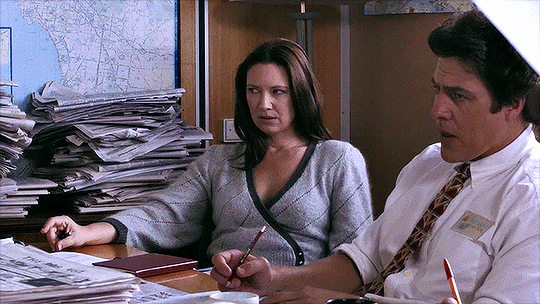
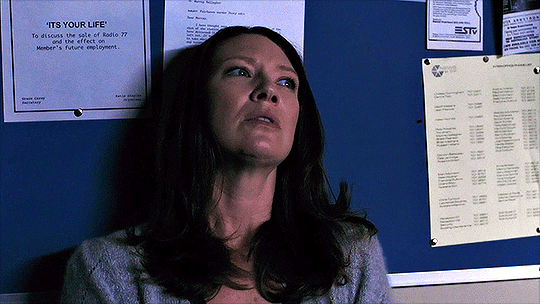

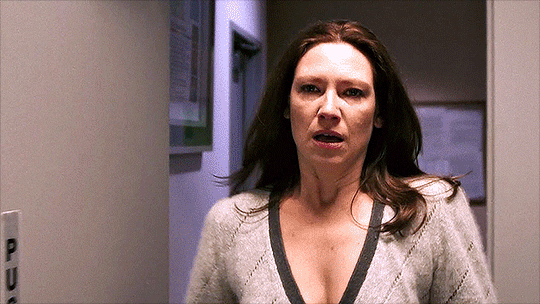


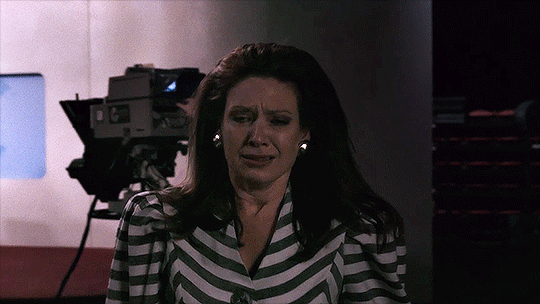

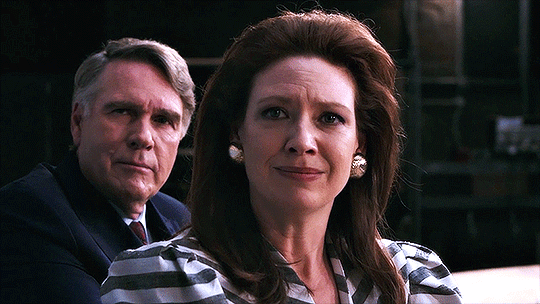
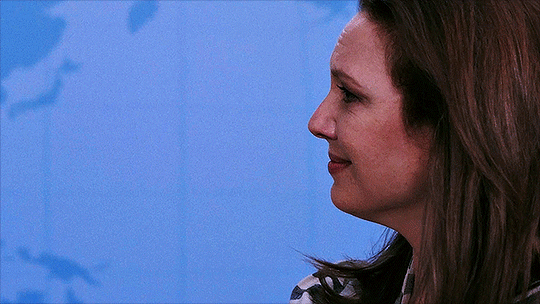


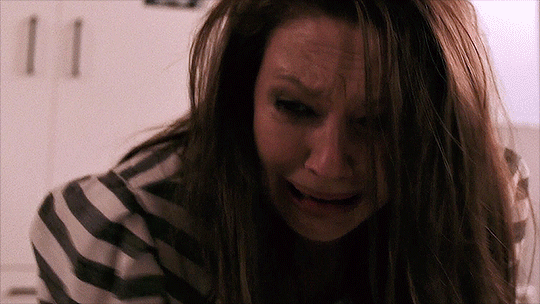
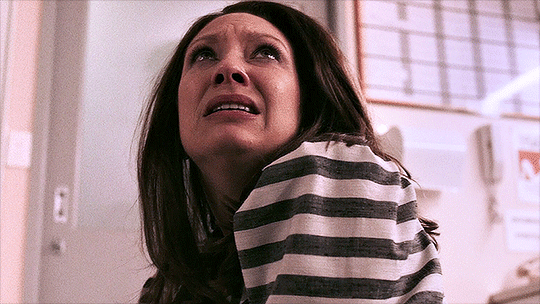
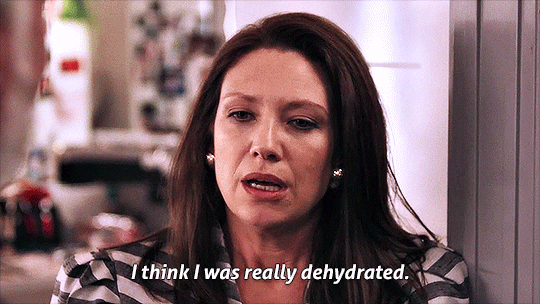
"I'm fascinated with people's comments about Helen, too. Everyone talks about, 'Oh, she's dramatic, she's a mess, she's this,' and I'm like, 'Naaah'. There's a little bit more going on, but it's the 80s, so no one's gonna talk about that either. No one's gonna help, no one's gonna protect, no one's gonna save." Anna Torv [x]
THE NEWSREADER | 1.02 "Once in a Lifetime"
#Anna Torv#Helen Norville#The Newsreader#anxiety#anxiety disorder#actually convinced she's got borderline personality disorder tbh#i have been obsessed with helen & her anxiety in this episode from the moment i first watched it#so you get a giant ass gifset from me aren't you lucky#as someone who deals with anxiety this is just captivating#i feel seen but also it hurts my soul#anna is just????#incredible#do i need to mention this looks much better on desktop than mobile again?#1.02 Once in a Lifetime#gifs*#mine
101 notes
·
View notes
Text
tip: I am so fucking mad
#yall will be like ohh mental health is so pronouns we love disabled advocacy#and then go out of your way to stalk harass and doxx a disabled poc who (checks notes) was a teenager with a dissociative disorder and did:#(checks notes again) stupid but overall not dangerous things#and proceed to compare them to real life predators and send the feds to their house for no reason#for internet clout.#you should not be proud of having quote ten years of documentation end quote on them when said individual is TWENTY THREE.#the way people on here treat ppl with mental illness is fucking incredible because they’re nothing but something to laugh at or something +#to dogpile and gang up on for some non existent justice#go outside
49 notes
·
View notes
Note
i hope you take this as the genuine question it is and not someone trolling or trying to be obtuse. i think i just spent about an hour writing this! 😅 i am fat, i first learned about and “became a part of” so to speak the body positive/fat liberation community my senior year in high school (8 years ago now). i cannot stress enough how much this question is coming from a well meaning place i just am curious your thoughts on it.
(re:girl dinner)
when we talk about body positivity, it’s understood your health is not determined by your size, no one can look at you and determine how healthy you are. your health, as well as the amount of food you eat, also has no bearing on your moral character. eating a conventially unhealthy amount of food doesn’t give anyone the right to try and shame or silence you, no matter their personal feelings or discomfort for various reasons (“you’re glorifying an unhealthy lifestyle!!” etc).
these principles are not even a question, so why do they not apply to people eating smaller quantities of food? why is the knee jerk reaction to call out how unhealthy it is and how they’re glorifying an unhealthy lifestyle and encouraging others to do the same, especially when that’s what fat people have been accused of forever? it seems so, so disconnected from and counter productive to the entire point of liberation from societal body/diet standards.
if it’s purely concern for the possible encouraging or egging on of harmful eating behaviors, even that could be said to go both ways. i struggle with binge eating disorder and have horrendous troubles with impulse control. to the point that concepts like intuitive eating would leave somebody like me lying in pain on the floor after a triggered binge. i know i personally have to be careful with what i eat because trigger foods could end with me sick. yet how downright inappropriate would it be to make that the problem of someone just enjoying a larger meal? someone who goes about their diet in a different way and has different limits than me? or god forbid even just also struggling with binging!? i mean, underlying eating disorder or not, whether they eat that way frequently or not, none of these things really make it okay regardless to comment on how much someone’s eating or propose that showing the amount of food they eat is not okay.
something i personally have had struggles with in my journey of self acceptance and navigating life in a marginalized body is having to unpack the aspects, and what i believed to be values, of my body positivity that i clung to for reasons that weren’t truly in line with fat liberation. so much of my activism was just me serving my insecurities because i hadn’t truly worked through them yet. just remember to check in on yourself sometimes and really dig into the root of some of the values you hold and make sure they’re coming from a place that’s beneficial.
tldr; someone showing off their small meal is fundamentally and healthwise no different from someone showing off their large meal. neither is inherently bad nor good, it just is. so why do we show double standards(on an across the board principle)?
I cannot stress enough just how flawed your comparison of fat people existing to people promoting two almonds and some water as "girl" dinner is not the same thing. yes, fat people are ACCUSED of glorifying disordered eating, but they are not actually doing that. people who use the term "girl" dinner are actively linking the act of eating small amounts of food or no food at all with being a girl, that's the major takeaway from this discussion. this isn't about shaming big meals vs small meals, either. this is about calling out actually actively advocating for eating nothing for dinner and going to bed. nobody is looking at the thin people promoting girl dinner and calling them out for being unhealthily skinny, we're calling them out for promoting not eating, which is something your body needs to do to function or your brain will shrivel up and you'll die. "girl dinner" is a depression meal, it's food when you can't afford groceries, it's a snack between something more substantial. also, how can you actually come to me and think that defending the slippery slope into eating disorders is a logical thing to do? tiktok is full of teenagers, dude, somebody needs to tell them that it's not fucking healthy to eat a slice of cheese and nothing else for dinner. this also isn't about shaming people at home living their personal lives and eating what they can to get by, this is about people actively posting to thousands of young impressionable followers that it's cool and fun to eat nothing, and in some cases it's literally being used to justify weight loss and being skinny. I would legitimately be just as critical about this if it was fat people eating piles of donuts and calling it lard dinner. but ultimately none of this even matters to either of us, I'm not going on tiktok and telling the teenagers that they're learning dumb shit, I'm not going and personally calling out the women responsible for corrupting a harmless trend, I'm just here sitting on my couch giving my opinion on my blog, and while you might not be on your couch you are certainly here giving your opinion in my ask box, at the end of the day we are just two clowns honking around 🤡
#genuinely mean no offense anon but i stand behind saying your logic is incredibly flawed#long post#tw disordered eating#ed tw
114 notes
·
View notes
Text
there's... something untapped, in the clear erosion of miguel's mental health under the same system that ate away his mother, her subsequent institutionalization, and the looming threat of capture now looming over miguel's head. he and conchata share abusers, and express clear suicidality as a product of years of fear and self-hatred. nueva york is a hypercapitalist society with no short supply of contempt for so-called undesirables—the disabled, the uneducated, the poor, and those in overlapping categories—that tarnish the faux glamour of the city.
at one point, conchata was "one of the good ones": visibly an Other, but smart, and beautiful. tyler calls her connie instead of her actual name. she was promised a better life if she joined the system. she has a mental health crisis and loses the ability to represent herself likely overnight; functionally and legally, her personhood has been taken from her. one generation later, her son is "one of the good ones": visibly an Other, but smart. handsome. useful. tyler calls him mike instead of his actual name.
he almost loses everything overnight when he stops behaving. the result is spider-man, and the knowledge that he will be treated as less than a person if his "condition" is discovered.
what an uncanny coincidence that his mental health also begins to degrade severely, no?
#conchata o'hara#miguel o'hara#miguel voice i'm problems#conchata voice and i'm disorder#rotating them in my head ALWAYS their relationship is so incredibly fascinating. like genuinely one of the most intriguing parent-child#relationships i have ever seen. the deep hurt. miguel's deep want to connect with her in particular and still mutually rebuffing one another#marvel comic blogging
120 notes
·
View notes
Text




been working on some splash arts again lately!
#i wanna drgag again#hopefully soon#long story short im getting help for a psychiatric disorder ive had for years#and part of it is that it makes it incredibly hard to function LOL#but#we ball!! we are going to ball!!!!#drgag#gods at gunpoint#fangan#fanganronpa#momoko#momoko norimaki#natsuka#natsuka oomori#kimiko usui#itsuki nakatsuka#itsuki#kimiko
25 notes
·
View notes
Text
Ok I wanted to come out and say this but
Yes Alastor is a narcissist. He is incredibly npd (narcissistic personality disorder) coded and I love him for it
However can you guys please stop calling him narcissist without really knowing what npd is? Because I know most of you looked at alastor, saw he had a very high opinion of himself and hes a bad person and labeled him a narcissist based on that
Please do more research into npd and, if you can, speak with people who have npd themselves before slapping narcissist on whatever you like. It is not a fun little character trait, it is a mental illness
Thank you
#idm if anyone dms me about npd if you want to talk#because i do have npd and i relate to alastor quite a bit in quite a few ways#and id be glad to explain why yes he has npd and this is what npd is to anyone#also please dont preach narc abuse to me thats just incredibly ableist lol#or tell me about how all narcs are bad people#you can ask but dont be rude about it#hazbin alastor#hazbin hotel#hazbin#hh#alastor the radio demon#the radio demon#hellaverse#vivziepop#npd#actually npd#narcissistic personality disorder
29 notes
·
View notes